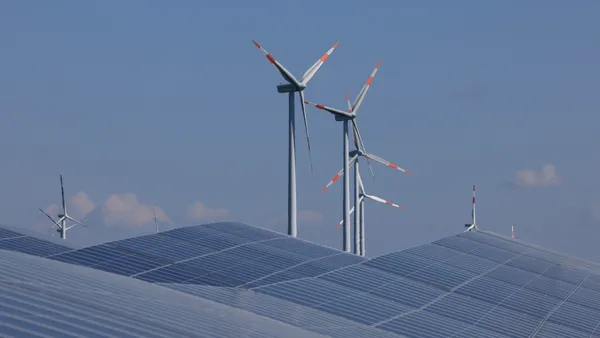Dive Brief:
- The Electric Power Supply Association (EPSA) filed a petition urging the U.S. Supreme Court to not review a lower courts' decision to strike down FERC Order 745, which vacated the regulators' authority over demand response markets.
- EPSA, the national trade association of competitive power suppliers, was joined on the brief by the the American Public Power Association, the Edison Electric Institute, the National Rural Electric Cooperative Association, Old Dominion Electric Cooperative, PJM Power Providers Group and PPL Entities, according to an email from an EPSA spokesperson.
- The Obama administration filed an appeal in January urging the justices to overturn the D.C. Circuit Court's ruling last May that vacated Order 745, but it could be months before the Supreme Court decides whether it will consider the case.
Dive Insight:
The national trade association for competitive power suppliers, along with a coalition of utilities, other generation companies and their industry groups, has weighed in to the FERC Order 745 debate, urging the Supreme Court to stay out of the case.
EPSA filed a brief in opposition to two petitions seeking review of the D.C. Circuit’s decision last May invalidating FERC Order 745. One petition was filed by the federal government, and another by a coalition of demand response providers.
EPSA said its brief makes several key points, including why the D.C. Circuit correctly decided the case, the lack of split circuit court decisions or variance from Supreme Court precedent, and why the case falls short of rising to the level of a matter of national importance.
In addition, EPSA said in a statement that while the D.C. Circuit invalidated Order 745 on two alternative grounds – lack of FERC jurisdiction and an arbitrary and capricious compensation scheme – "those seeking Supreme Court review have only asked for it on jurisdiction, which essentially amounts to a request for an advisory opinion."
Critics say EPSA and the companies in its coalition oppose an expanded role for demand response because it means they will sell less power as utilities cut demand during peak hours. Sustainability advocates and grid operators tend to support demand response because it cuts carbon emissions and allows utilities to better handle spikes in power demand without paying exorbitant prices on real-time power markets.
Environmental groups last month urged the court to consider an appeal of FERC Order 745, arguing the decision to vacate FERC's authority over demand response hurts markets and upends a well-understood regulatory environment.















